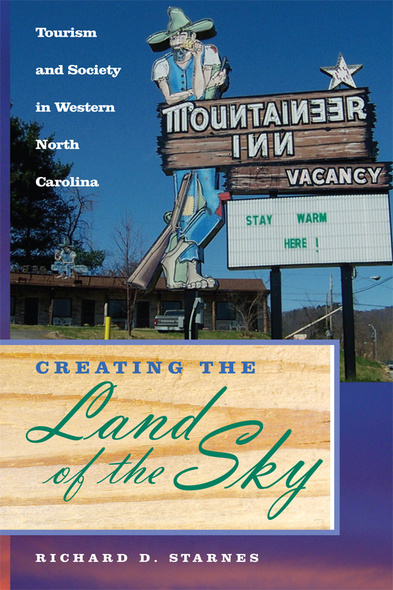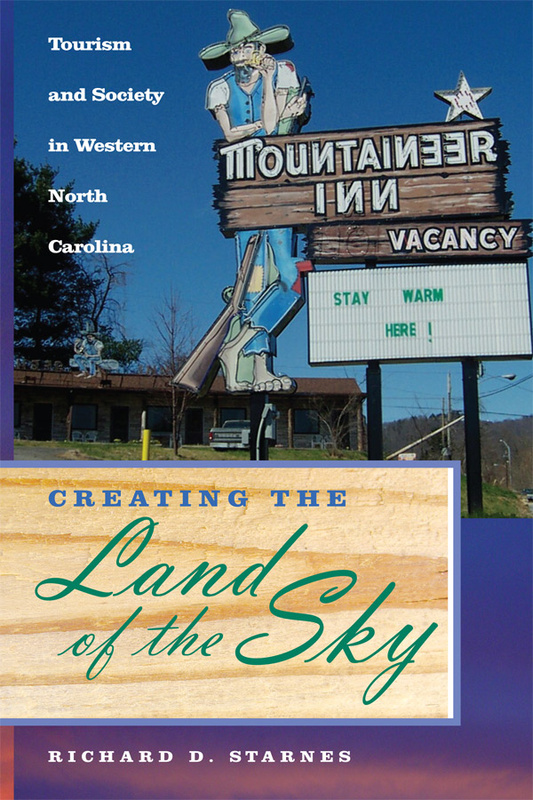Creating the Land of the Sky
Tourism and Society in Western North Carolina
A sophisticated inquiry into tourism's social and economic power across the South.
In the early 19th century, planter families from South Carolina, Georgia, and eastern North Carolina left their low-country estates during the summer to relocate their households to vacation homes in the mountains of western North Carolina. Those unable to afford the expense of a second home relaxed at the hotels that emerged to meet their needs. This early tourist activity set the stage for tourism to become the region's New South industry. After 1865, the development of railroads and the bugeoning consumer culture led to the expansion of tourism across the whole region.
Richard Starnes argues that western North Carolina benefited from the romanticized image of Appalachia in the post-Civil War American consciousness. This image transformed the southern highlands into an exotic travel destination, a place where both climate and culture offered visitors a myriad of diversions. This depiction was futher bolstered by partnerships between state and federal agencies, local boosters, and outside developers to create the atrtactions necessary to lure tourists to the region.
As tourism grew, so did the tension between leaders in the industry and local residents. The commodification of regional culture, low-wage tourism jobs, inflated land prices, and negative personal experiences bred no small degree of animosity among mountain residents toward visitors. Starnes's study provides a better understanding of the significant role that tourism played in shaping communities across the South.
Aside from the welcome addition of a chapter devoted to Protestant religious tourism, this is a barely revised version of Starnes's 1999 dissertation. Post-1999 scholarship (e.g., Logan Brown's 2001 thesis, 'An Historical Examination of Tourism Marketing Imagery in Western North Carolina and Its Impacts on Cultural Interpretation of the Landscape'), is not cited much, nor is the recent push for 'heritage tourism.' The subtitle is misleading; this is a history of tourism in the vicinity of Asheville, with lesser emphasis on the area to its southwest and almost none on that to its north (reflected, not surprisingly, in the local newspapers cited and regional archives consulted). These limitations aside, this is a carefully researched, well-written history. It begins in antebellum times, when low-country planters visited to escape summer heat and disease, and continues through the construction of railroads, highways, and national parks that opened up the area to tourists of more moderate means. Starnes (Western Carolina Univ.) examines the ways both natives and outsiders marketed the region, the impacts of tourism development on local culture and society, and the often-overlooked role played by African Americans in this history. Summing Up: Recommended. All levels/libraries.'
—CHOICE
0false18 pt18 pt00falsefalsefalse‘Starnes well describes some of the detrimental consequences, such as low wages and higher crime rates, of the region’s having followed a tourism development path. He also provides some fine discussion of the trade-offs between tourism and industrial development and tourism’s impact on local communities. This study can serve as a fine model for others to follow in telling the history of other locales.’
—Journal of American History
‘This book lies at the intersection of so many academic subfields. Starnes’s synthetic approach is one of the book’s greatest strengths. His historiography is excellent. Forthcoming studies will be built on [the book’s] path-breaking approach. The questions Starnes has raised will define the field for years to come.’
—Journal of Social History
‘The work is both topical and chronological. He uses a wide variety of sources creatively. Additionally, he uses a good range of secondary sources . . . a work that breaks new ground. Starnes helps expand our knowledge of New South boosterism throughout the South. His work is a welcome contribution to western North Carolina history and other scholarship that bridges the historiographical gap between Appalachia and the South.’
—H-Net Reviews






